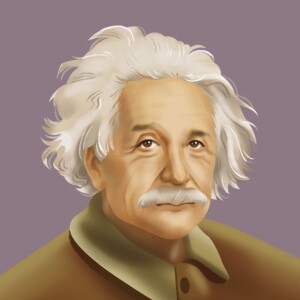
Friday Dec 08, 2023
Unlocking Genius: The Life and Legacy of Walter Isaacson
What was Einstein's famous question?
Albert Einstein is known for asking many thought-provoking questions throughout his life and career as a physicist. However, one of his most famous questions is often referred to as "Einstein's elevator question" or "Einstein's elevator thought experiment." This question is used to illustrate the principle of equivalence in his theory of general relativity.
Einstein's elevator question goes like this: If someone is in a windowless elevator that is accelerating upwards at a rate equal to the acceleration due to gravity on Earth, would they be able to determine whether they are in an elevator or in a stationary room on the surface of the Earth?
Einstein used this question to challenge the prevailing understanding of gravity at the time. According to his theory of general relativity, gravity is not a force but rather the curvature of spacetime caused by the presence of mass and energy. In this thought experiment, the elevator is accelerating upwards, and the person inside feels a force similar to the force of gravity. Therefore, Einstein argued that there would be no experiment an observer could perform to determine whether they are in an elevator accelerating upwards or in a stationary room on Earth feeling the force of gravity.
This thought experiment highlights the principle of equivalence, which states that gravitational forces are indistinguishable from the inertial forces experienced in an accelerated reference frame. It revolutionized our understanding of gravity and had a profound impact on the development of modern physics.
What did Einstein fail to solve?
Albert Einstein was one of the greatest theoretical physicists of all time, but there were a few scientific puzzles that he was not able to solve during his lifetime. Some of the notable unsolved problems that Einstein grappled with include:
- Unified Field Theory: Throughout his career, Einstein sought to unify the two pillars of theoretical physics: general relativity, which describes gravity, and quantum mechanics, which explains the behavior of subatomic particles. He spent the later years of his life in pursuit of a theory that could unite these two fundamental forces, but he was not successful in finding a complete solution.
- The Quantum Measurement Problem: Einstein famously disagreed with the probabilistic nature of quantum mechanics, objecting to the idea that the behavior of particles can only be described by probabilities rather than definite properties. He criticized the theory by stating "God does not play dice with the universe." Although his arguments stimulated discussions and research in the field, a satisfactory solution to the measurement problem, which concerns the collapse of the wave function upon measurement, remains elusive.
- Black Holes: Despite his groundbreaking work on general relativity, which predicted the existence of black holes, Einstein did not fully understand the nature of these cosmic entities. In fact, he even doubted their existence for a portion of his career. It was not until many years later, after his death, that scientists were able to grasp the complexities of black holes more comprehensively.
- Cosmological Constant: In his formulations of general relativity, Einstein introduced a parameter called the cosmological constant. He initially included it to account for a static universe but later discarded it when the expansion of the universe was discovered. However, recent observations suggest the existence of dark energy, which might be related to an effective cosmological constant. Although Einstein's equations are not inconsistent with such an idea, his original motivation for introducing it remains unanswered.
While Einstein's inability to solve these problems does not diminish his scientific contributions, they continue to challenge physicists to this day and serve as the foundation for ongoing research in theoretical physics.
What was Einstein's successful story?
Albert Einstein's successful story is primarily centered around his groundbreaking work in the field of theoretical physics. One of his most notable achievements was the formulation of the theory of relativity, which revolutionized our understanding of space, time, and gravity.
Einstein's theory of relativity, published in 1915, presented a new framework for understanding the fundamental laws of physics. It challenged Newtonian mechanics by demonstrating that the laws of physics remain the same for all observers, regardless of their relative motion. This led to the famous equation E=mc², which expressed the equivalence of mass and energy.
The theory of relativity greatly influenced various scientific disciplines and had significant practical applications. For instance, it played a crucial role in the development of technologies such as nuclear power and GPS systems.
Einstein's remarkable contributions to physics earned him global recognition, and he was awarded the Nobel Prize in Physics in 1921 for his explanation of the photoelectric effect. However, his legacy extends far beyond this honor. He became an iconic figure, known not only for his scientific brilliance but also for his advocacy for peace, civil rights, and humanitarian causes.
Einstein's success extended beyond academia as well. He held various prestigious positions, including a professorship at the University of Berlin and directorship of the Kaiser Wilhelm Institute for Physics in Berlin. He also became a prominent figure in the international scientific community, collaborating with other renowned physicists and contributing to the establishment of the Hebrew University of Jerusalem.
Overall, Einstein's successful story lies in his groundbreaking contributions to science, the profound impact of his theories, and his lasting influence on our understanding of the universe. His legacy continues to inspire future generations of scientists and intellectuals.
No comments yet. Be the first to say something!